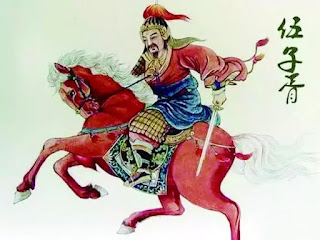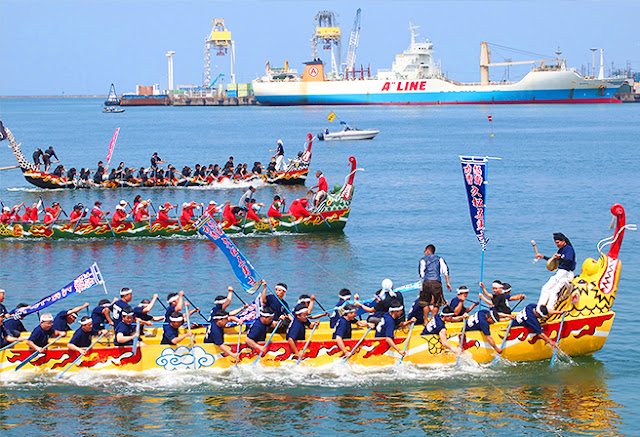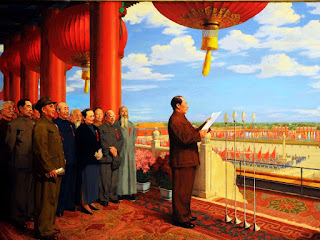Myths About Dragon Boat Festival
Dragon Boat Festival is one of the most famous traditional holidays in China. It was initially a local holiday in south China to worship totem. Gradually, the holiday was given a new purpose of memorizing the great poet Qu Yuan. There are different opinions about how the festival came into being, which results in different terms and celebrating activities for the holiday.
Basics of Dragon Boat Festival
 |
| Dragon Boat Festival |
Name: Duanwu, Duanyang, Longri, Longzhou (Dragon Boat), Tianzhong Festival, etc.
Date: May 5th in the Chinese lunar calendar
Origin: totem worship
Primary Holiday Food: Zongzi
Celebration: dragon boat race, hanging wormwood and calamus on the door, drink wine
Origin of the Dragon Boat Festival
There are many conjectures about the origin of the Dragon Boat Festival, here are four widely accepted versions.
Dragon Boat Festival and Qu Yuan
Qu Yuan was a minister under King Huai of Chu State during the Warring States Period. He was a famous poet, talented politician, and patriot. At the time, the powerful Qin State was vying for other states. Qu Yuan advised the King Huai to unite with the Qi State and go against the Qin State, which was vehemently opposed by Zilan and other ministers in the court. He was exiled by the slander to the Hunan area. During his exile, Qu Yuan created some of the eternal poems like Li Sao (Sorrow After Departure), Tian Wen (A Request to God), and Jiu Ge (Nine Odes). Several years later, the news that the Qin army broke into the capital of Chu State came to Qu Yuan. He was devastated that he jumped into the Miluo River with a stone after finishing his last poem Huai Sha (Recalling the Sand).
 |
| Qu Yuan |
Chu people hurried to get Qu Yuan's body but failed. A fisherman took out some food that he prepared for Qu Yuan and threw them into the river, hoping that the underwater creatures eat the food he threw instead of Qu Yuan's flesh. An old medic poured a jar of realgar wine into the river to stun the fish and other animals in water so that they won't hurt Qu Yuan's body. Later, people invented Zongzi to be thrown into the water.
Dragon Boat Festival and Wu Zixu
Wu Zixu was a subject in the Chu State. He sought refugee in the Wu State after his father and brothers being murdered by the Chu King. Later, Wu Zixu successfully helped Wu King to break into the capital of the Chu State. However, the king that killed his family was already dead. Wu Zixu dug up the dead king's tomb to vent his hatred and whipped the body over 300 times to vent his hatred.
 |
| Wu Zixu |
In the Wu State, Wu Zixu continued his role as an influential minister in the court when the new Wu King Fu Chai came to the throne. He assisted the young king and annihilated the neighboring Yue State. Yue Kong Gou Jian pleaded for peace. Wu Zixu advised the Wu King to decline the peace offering and wipe out the Yue state entirely, but the young king didn't listen to him. Another minister, who was bribed by the Yue King, slandered Wu Zixu in front of the Wu King, resulting in Wu Zixu being asked to commit suicide. Therefore, Wu Zixu cut his own throat. Before he died, Wu Zixu asked his neighbor to hang his eyes on the Wu capital gate to see how the Yue Army would enter the city. Wu King Fu Chai was infuriated by saying that he ordered Wu Zixu's body to be collected in a leather bag and thrown into the river. To memorize Wu Zixu, people started to throw Zongzi and other food into the river.
Dragon Boat Festival and Cao E
The third legend believes that the Dragon Boat Festival is to commemorate Cao E, a filial daughter in the Eastern Han
 |
| Caoe Temple |
Dragon Boat Festival and Totem Worship
In modern times, the archaeological findings confirm that an ancient tribe in the middle and lower reaches of the Yangtze
 |
| Dragon Totem |
How to Celebrate the Dragon Boat Festival?
People in different regions of China celebrate the Dragon Boat Festival in different ways, but the following four activities are common all over China.
Race Dragon Boat
Dragon Boat race is a primary custom of the Dragon Boat Festival. It originated from the fact that Chu people raced the boat to save Qu Yuan on the Miluo River. Therefore, the boat race became an activity to memorize Qu Yuan. The boats used for the race in the Warring States Period were dugout canoes. They were lined up in the shape of a dragon and race forward along with the drum beating. The ceremony was semi-religious and semi-entertaining. Today, the boat race is much advanced but equally exciting.
 |
| Race Dragon Boat |
Eat Zongzi
Zongzi is the essential food during the Dragon Boat Festival. It’s a four-squared dumpling with leaves as wrapper and glutinous rice and other ingredients as fillings. There are different kinds of Zongzi. The south Chinese people prefer salty Zongzi that is made from glutinous rice and pork. In contrast, the north Chinese people prefer sweet Zongzi that is made from glutinous rice, rice, and beans. Today, people are very creative about making Zongzi. More fillings are invented to fill Zongzi.
 |
| Zongzi |
Wear Sachet
Chinese people believe that the sachets have the function of expelling evil and exorcising plague. But they are used for decoration. The sachet usually contains cinnabar, realgar, and fragrant medicine, making it smell good.
 |
| Sachet |
Hang Wormwood Leaves
Wormwood leaf is a kind of Chinese herb that gives a special fragrance that can repel mosquitoes, flies, and other insects. Chinese medics often add the wormwood leaves into medicine to cure certain diseases. Why did the ancient Chinese hang wormwood leaves on their door? It turns out that the Dragon Boat Festival was also a holiday for hygiene. People hang the wormwood leaves on the door and sprinkle realgar wine in the yards to sterilize and prevent diseases. In some places, people also collect herbs at the festival.
 |
| Wormwood Leaves |
Why Do People Eat Zongzi?
To prevent the fish and shrimps from eating Qu Yuan’s flesh, Zongzi was invented to allure these creatures. The original Zongzi was nothing like that of today. The glutinous rice was put into a thick bamboo tube. Why was the square Zongzi replaced with the tube Zongzi?
Chu Xue Ji records that a Changsha person in Han dynasty dreamed of Qu Yuan telling him that the tube Zongzi thrown in the river was stolen by the flood dragon. Only the Zongzi wrapped with wormwood leaves and tied with five-color silk threads could scare off the dragon. Therefore, people began to use wormwood leaves and silk threads to make Zongzi. Later, wormwood leaves were replaced by other leaves like lotus leaves and reed leaves.
 |
| Zongzi |
What Countries Celebrate the Dragon Boat Festival?
Affected by Chinese culture, many countries in Asia also attach great importance to the festival. Many other countries began to celebrate the holiday as well.
South Korea
South Korea attaches great importance to the Dragon Boat Festival. It has a 20-day long celebration and holds many activities like dance, wrestling, swinging, football games, etc.. Gangneung Danoje Festival, which dates back to 1000 years ago, is one of the holiday's grandest activities.
 |
| Gangneung Danoje Festival |
Japan
The Dragon Boat Festival was introduced to Japan during the Heian Period (794-1192), and the Japanese also eat Zongzi and drink calamus wine. However, “calamus” sounds a lot like “warrior” in the Japanese language. Therefore, it became a holiday for boys. Japanese people set up koinobori in front of the door and put warrior figures, armor, and armets, hoping that their boys will accomplish something in the future.
Singapore
Singaporeans are a lot like the Chinese. In fact, many of them have Chinese ancestors, which make them share the same cultural root as Chinese people. At Dragon Boat Festival, Singaporeans also have Zongzi and organize dragon boat races. The dragon boat race in East Coast Park often attracts tons of teams worldwide to compete.
Vietnam
Vietnamese people also have the Dragon Boat Festival; they have similar celebrations as that of China. They have Zongzi, expel insects, wear colorful lucky charms, and drink realgar wine.
The United States and Germany
With the Chinese culture being accepted by more western countries, the dragon boat race becomes popular in the United States and Germany as well. Nowadays, teams from all over the world celebrate the holiday by competing in the boat race.
Plan to visit China? Check out some itineraries for reference
14 days Culture and Nature Trip
14 Days Beijing - Xian - Chengdu- Yangtze River Cruise - Shanghai Tour
12 Days Beijing - Xian - Chengdu- Guilin - Shanghai Tour
11 Days Beijing - Xian - Guilin - Shanghai Tour
7 Days Golden Hunan Tour to Fenghuang, Zhangjiajie and Changsha







Comments
Post a Comment